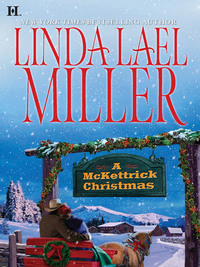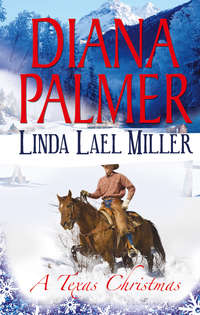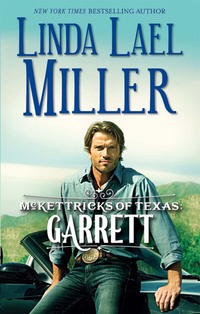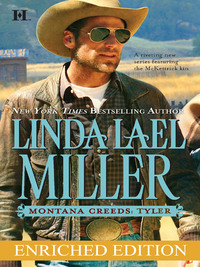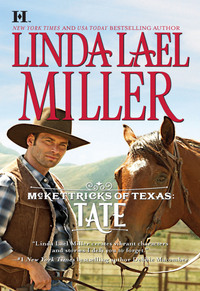
Полная версия
Here and Then
Rue narrowed her eyes as he came toward the cell, carrying the kettle by its black iron handle, fingers protected from the steam by the same rumpled dish towel he’d used to wipe out the mug earlier.
“I’m not planning to strip down and lather up in front of you, Marshal,” she warned, standing back as he unlocked the cell door and came in.
He laughed, and the sound was unexpectedly rich. “That would be quite a show,” he said.
Rue wasn’t sure she appreciated his amusement. She just glared at him.
Farley set the kettle down in the cell, then went out and locked the door again. He handed Rue a rough towel and a cloth through the bars, then ambled over to collect his hat and canvas duster.
“Good night, Miss Claridge.” With that, he blew out the kerosene lantern on his desk, plunging the room into darkness except for the thin beams of moonlight coming in through the few windows.
It was remarkable how lonely and scared Rue felt once he’d closed and locked the front door of the jailhouse. Up until then, she’d have sworn she wanted him to go.
She waited until she was reasonably sure she wouldn’t be interrupted before hastily stripping. Shivering there in that cramped little cell, Rue washed in the now-tepid water Farley had brought, then put her clothes back on. After wrapping herself in the Civil War blanket, she lay down on the cot and closed her eyes.
Although Rue fully expected the worst bout of insomnia ever, she fell asleep with all the hesitation of a rock dropping to the bottom of a deep pond. She awakened to a faceful of bright sunlight and the delicious smell and cheerful sizzle of bacon frying.
At first, Rue thought she was home at Ribbon Creek, with her granddaddy cooking breakfast in the ranch house kitchen. Then it all come back to her.
It was 1892 and she was in jail, and even if she managed to get back to her own time, no one was ever, ever going to believe her accounts of what had happened to her.
She would definitely write a novel. A movie would inevitably follow. Priscilla Presley could play Rue, and they could probably get Tom Selleck for Farley’s role, or maybe Lee Horsely….
Rue rose from the bed and immediately shifted from one foot to the other and back again.
“’Morning,” Farley said with a companionable smile. He was standing beside the stove, turning the thick strips of pork in a cast-iron skillet.
“I have to go to the bathroom,” Rue told him impatiently. “And don’t you dare offer me a chamber pot!”
The marshal’s white teeth flashed beneath his manly mustache. Expertly, he took the skillet off the heat, setting it on a trivet atop a nearby bookshelf, then ambled over to face Rue through the bars.
“Don’t try anything,” he warned, gesturing for Rue to precede him into freedom.
She stepped over the grubby threshold, concentrating on appreciating the sweet luxury of liberty, however brief it might be.
The marshal ushered her outside and around the back of the small building. Behind it was a small, unpainted cabin, and beyond that was an outhouse.
Rue wrinkled her nose at the smell, but she was in no position to be discriminating.
She went inside and, peering through the little moon some facetious soul had carved in the door, saw Farley standing guard a few feet away, arms folded.
When they were back in the jailhouse, he gave her soap and a basin of water to wash in before setting the bacon on to finish cooking. Rue felt a little better after that, though she longed for a shower, a shampoo and clean clothes.
“I suppose you’ll be releasing me this morning,” she said after Farley had brought her a metal plate containing three perfectly fried slices of bacon, a dry biscuit and an egg so huge, it could have been laid by Big Bird’s mother. “After all, if playing poker were a crime, you’d have to arrest Stovepipe and Garters and Quickdraw.”
Farley, who was perched on the edge of his desk, consuming his breakfast, laughed. Then he chewed a bite of bacon with such thoroughness that Rue grew impatient.
Finally, he responded. “I reckon you’re referring to Harry and Micah and Jim-Roy, and you’re partly right. It isn’t against the law for them to play poker, but Pine River has an ordinance about women entering into unseemly behavior.” Farley paused, watching unperturbed as Rue’s face turned neon pink with fury. “You not only entered in, Miss Claridge—you set up housekeeping and planted corn.”
“That’s the most ridiculous thing I’ve ever heard!” Rue thought about flinging her plate through the bars like a Frisbee and beaning Farley Haynes, but she hadn’t finished her breakfast and she was wildly hungry. “It’s downright discriminatory!”
Farley went to the stove and speared himself another slab of bacon from the skillet. “Nevertheless,” he went on, “I can’t ask the good citizens of this town to support you forever.”
“If you’d just wire Elisabeth in San Francisco—”
“Nobody’s heard from Jon and Lizzie,” Farley interrupted. “They were in such a hurry to get started on their honeymoon, they didn’t bother to tell anybody where they were going to stay once they got to California. They weren’t planning to return until Jon’s hand has healed and he’s ready to start doctoring again.”
Rue finished her breakfast with regret. Although loaded with fat and cholesterol, the food had tasted great. “People have mentioned a little girl. Did they take her with them?”
Farley nodded. “Yes, ma’am. Looks like we’ll just have to wait until Jon decides to write a letter to somebody around here. When he left, he wasn’t thinking of much of anything besides Lizzie.”
After handing her empty plate through the bars, Rue folded her arms and sighed. “They’re really in love, huh?”
The marshal’s blue eyes sparkled. “You might say that. Being within twelve feet of those two is like being locked up in a room full of lightning.”
Rue took comfort in the idea that this whole nightmare might not have been for nothing. If Bethie was really happy and truly in love with the country doctor she’d married, well, that at least gave the situation some meaning.
“I understand there was a fire and that nobody really knows how Dr. Fortner and his little girl escaped.”
Farley stacked his plate and Rue’s neatly on the trivet and poured the bacon grease from the frying pan into a crockery jar. “That’s right. Of course, what’s important is, they’re alive. There are a lot of goings-on in this world that don’t lend themselves to reasoning out.”
“Amen,” agreed Rue, thinking of her own experiences.
After fetching a bucket of water from outside, Farley put another kettle on to heat.
“You are going to give back my poker winnings, aren’t you?” Rue asked nervously. She needed that money to buy some acceptable clothes and pay for a room. Provided she could find someone willing to rent her one, that is.
Farley took a mean-looking razor from his desk drawer, along with a shaving mug and a brush. “It’d serve you right if I didn’t,” he said calmly, studying his reflection in a cracked mirror affixed to the wall near the stove. “But I’ll turn the money over to you as soon as I decide to let you go.”
Rue’s temper simmered at his blithely officious attitude, but she held her tongue. It was a technique she usually remembered after a conflagration, not before.
She watched, oddly fascinated, when Farley poured water from the kettle into a basin and splashed his face. Then, after moistening his shaving brush, he turned the bristles in the mug and lathered his beard.
Presently, he began using the straight razor with what seemed to Rue to be extraordinary skill.
The whole process was decidedly masculine, and it had a very curious—and disturbing—effect on Rue. Every graceful motion of his hands, every turn of his head, was like a caress; it was as though Farley were removing her clothes and taking the time to explore each new part of her as he bared it. And that odd feeling that she’d just collided with a solid object was back, too; she gripped the bars tightly to hold herself up.
When Farley gave her a sidelong look and grinned, she felt as though the bones in her pelvis had turned to warm wax.
Rue had spent a lot of time on a ranch, and she’d traveled and met people, read hundreds of books, watched all sorts of movies, so she had a pretty fundamental understanding of what was happening in her body. What she didn’t comprehend was exactly what it would be like to make love, because that was something she hadn’t gotten around to doing quite yet. It wasn’t that she was scared or even especially noble—she just hadn’t found the right man.
Farley finished shaving, humming a little tune all the while, rinsed his face and dried it with the towel draped around his neck.
The jailhouse door opened, and Rue noticed that Farley’s hand flashed with instinctive speed and grace to the handle of the six-gun riding low on his hip.
His fingers relaxed when a big woman dressed in black bombazine entered. Her eyes narrowed in her beefy face when she caught sight of the prisoner. Two other ladies in equally somber dress wedged themselves in behind her.
“Something tells me the Presbyterians have arrived,” Rue murmured.
“Worse,” Farley whispered. “These ladies head up the Pine River Society for the Protection of Widows and Orphans, and they’re really mean.”
The trio stared at Rue, their mouths dropping open as they took in her jeans, sneakers and T-shirt.
“Poor misguided soul,” one visitor said, raising bent fingers to her mouth in consternation and pity.
“Trousers!” breathed another.
The heavy woman whirled on Farley, and Rue noticed that a muscle twitched under his right eye.
“This is an outrage!” the lady thundered, as though he were somehow to blame for Rue’s existence. “Where on earth did she get those dreadful clothes?”
“I can speak for myself,” Rue said firmly, and the other two women gasped, evidently at her audacity. “This is called a T-shirt,” Rue went on, indicating the garment in question, “and these are jeans. I know none of you are used to seeing a woman dressed the way I am, but the fact is, these clothes are really quite practical, when you think about it.”
“Well, I never!” avowed the leader of the pack.
Rue’s mouth twitched. “Never what?” she inquired sweetly.
Farley rolled his eyes, but offered no comment. It was plain that, although he wasn’t really intimidated by these women, he wasn’t anxious to cross them, either.
“Are you a saloon woman?” demanded the leader of the moral invasion. The moment the words were out of her mouth, she drew her lips into a tight line and retreated a step, no doubt concerned that sin might prove contagious.
Rue smiled. “No, Miss—What was your name, please?”
“My name is Mrs. Gifford,” that good lady snapped.
Holding one hand out through the bars, Rue smiled again, winningly. “I’m very glad to meet you, Mrs. Gifford. My name is Rue Claridge, and I’m definitely not a ‘saloon woman.’” She dropped her voice to a confidential whisper. “Just between you and me, I think I’m probably overqualified for that kind of work.”
Mrs. Gifford turned away and gathered her bombazine-clad troops into a huddle. While the conference went on, Rue stood biting her lower lip and wondering whether or not Farley would turn her over to these people. She thought she’d rather take her chances with a lynch mob, if given the choice.
Farley scratched the back of his neck and sighed. Judging from his body language, Rue was pretty sure he wanted to let her go and get on with the daily business of being a living, breathing antique.
Finally, Mrs. Gifford approached the cell again. “There will be no more prancing up and down the street in trousers and no more poker playing,” she decreed firmly.
Under any other circumstances, Rue would have defended her right to dress and gamble as she liked, but she wasn’t about to risk getting herself into still more trouble. For all she knew, Mr. Gifford was a judge with the power to lock her away in some grim prison.
“No more poker playing,” Rue conceded in a purposely meek voice. “As for the—trousers, I promise I won’t wear them any farther than the general store. I mean to go straight over there and buy a dress as soon as the marshal here lets me out of the pokey.”
The delegation put their heads together for another consultation. After several minutes, Mrs. Gifford announced, “Rowena will walk down to the mercantile and purchase the dress,” she said, indicating one of the other women.
“Great,” Rue responded, shifting her gaze to the marshal. “Will you give Rowena fifty cents from my winnings so I can get out of here?” If the Society tried to make her go with them, she’d make a break for it.
Rowena, who was painfully thin, her mousy brown hair pulled back tightly enough to tilt her eyes, swallowed visibly and backed up when Farley held out the money.
“Poker winnings,” she said in horror. “My hands will never touch filthy lucre!”
Now it was Rue who rolled her eyes.
“I’ll get the dress,” Farley bit out furiously, grabbing his hat from its peg and putting on his long canvas duster. A moment later, the door slammed behind him.
The church women stared at Rue, as though expecting her to turn into a raven and fly out through the barred window.
Thank God I didn’t land in seventeenth-century Salem, Rue thought wryly. I’d surely be in the stocks by now, or dangling at the end of a rope.
Basically a gregarious type, Rue couldn’t resist another attempt at conversation, even though she knew the effort was probably futile. “So,” she said, smiling the way she did when she wanted to put an interviewee at ease, “what do you do with yourselves every day, besides cooking and cleaning and tracking down sinners?”
Конец ознакомительного фрагмента.
Текст предоставлен ООО «ЛитРес».
Прочитайте эту книгу целиком, купив полную легальную версию на ЛитРес.
Безопасно оплатить книгу можно банковской картой Visa, MasterCard, Maestro, со счета мобильного телефона, с платежного терминала, в салоне МТС или Связной, через PayPal, WebMoney, Яндекс.Деньги, QIWI Кошелек, бонусными картами или другим удобным Вам способом.



